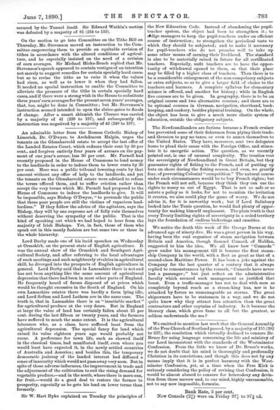Lord Derby made one of his lucid speeches on Wednesday
at Ormskirk, on the present state of English agriculture. It was the annual show of the Ormskirk and Southport Agri- cultural Society, and alter referring to the local advantages of such meetings and such neighbourly rivalries in agricultural skill, he diverged into the prospects of English agriculture in general. Lord Derby said that in Lancashire there is not and has not been anything like the same amount of agricultural depression that there had been in most other parts of England. He frequently heard of farms disposed of at prices which would bethought excessive in the South of England. On his own Lancashire estates there was hardly a farm lying idle, and Lord Sefton and Lord Lathom are in the same case. The truth is, that in Lancashire there is an "insatiable market" for agricultural produce at the very doors. Bat in England at large the value of land has certainly fallen about 25 per cent. during the last fifteen or twenty years, and the farmers have suffered to much the same extent. It is the agricultural labourers who, as a class, have suffered least from the agricultural depression. The special fancy for land which raised its value eighteen years ago would probably not recur. A preference for town life, such as showed itself in the classical times, had manifested itself, even where you would least have expected it, in the newly settled countries of Australia and America; and besides this, the temporary democratic jealousy of the landed interest had diffused a sense of insecurity which would not pass away very soon. But in spite of these adverse influences, the improvement in trade and the adjustment of the cultivation to suit the rising demand for vegetable produce,—and in the south, where there is more sun, for fruit—would do a good deal to restore the farmer to prosperity, especially as he gets his land on lower terms than formerly.




































 Previous page
Previous page